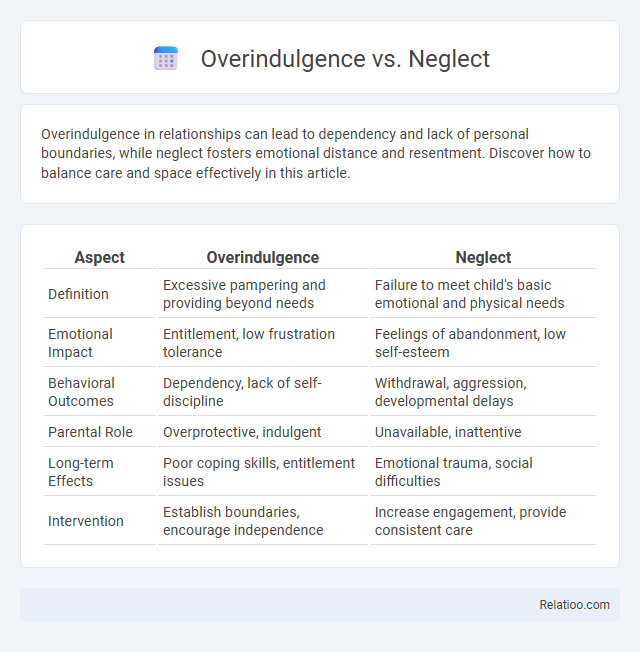Overindulgence in relationships can lead to dependency and lack of personal boundaries, while neglect fosters emotional distance and resentment. Discover how to balance care and space effectively in this article.
Table of Comparison
| Aspect | Overindulgence | Neglect |
|---|---|---|
| Definition | Excessive pampering and providing beyond needs | Failure to meet child's basic emotional and physical needs |
| Emotional Impact | Entitlement, low frustration tolerance | Feelings of abandonment, low self-esteem |
| Behavioral Outcomes | Dependency, lack of self-discipline | Withdrawal, aggression, developmental delays |
| Parental Role | Overprotective, indulgent | Unavailable, inattentive |
| Long-term Effects | Poor coping skills, entitlement issues | Emotional trauma, social difficulties |
| Intervention | Establish boundaries, encourage independence | Increase engagement, provide consistent care |
Understanding Overindulgence and Neglect
Overindulgence involves excessive pampering or providing too many resources, often leading to a lack of discipline and poor self-regulation in children. Neglect, characterized by insufficient attention, care, and emotional support, results in developmental delays and emotional difficulties. Understanding the contrasting effects of overindulgence and neglect is crucial for fostering balanced parenting that promotes healthy emotional and social growth.
Psychological Roots of Overindulgence
Overindulgence often stems from deep-seated psychological factors such as insecurity, unmet emotional needs, or a desire for control and comfort. Your tendency to overindulge can be traced to early attachment issues or a lack of boundaries established during childhood, influencing adult behavior. Understanding these psychological roots is crucial for addressing overindulgence effectively and promoting healthier coping mechanisms.
The Dangers of Neglect in Child Development
Neglect in child development poses severe risks including delayed cognitive growth, emotional instability, and impaired social skills. Your child may struggle with low self-esteem, attachment disorders, and increased vulnerability to mental health issues due to lack of proper attention and care. Addressing neglect early is crucial to preventing long-term developmental and psychological consequences.
Recognizing Signs of Overindulgence
Recognizing signs of overindulgence involves identifying excessive pampering or failure to set appropriate boundaries, which can lead to unrealistic expectations and entitlement in your child. Unlike neglect, where basic needs are unmet, overindulgence often results in lack of discipline and poor emotional regulation. Your awareness of these signs helps balance nurturing and structure for healthy development.
Identifying Patterns of Neglect
Identifying patterns of neglect involves observing consistent lack of attention, emotional support, or basic needs over time, which can significantly impact Your emotional and psychological development. Unlike overindulgence, which involves excessive pampering or fulfillment of desires, neglect is characterized by omission or absence of necessary care. Recognizing these differences is crucial for addressing underlying issues and promoting healthier behavioral patterns.
Emotional Consequences of Both Extremes
Overindulgence often leads to emotional consequences such as entitlement, anxiety, and difficulty managing frustration, while neglect can cause feelings of abandonment, low self-esteem, and emotional insecurity. Both extremes disrupt healthy emotional development, increasing risks for behavioral problems and impaired social relationships. Balancing nurturing support without excess or absence is crucial for fostering emotional resilience and psychological well-being.
Parenting Strategies: Finding the Balance
Effective parenting strategies require balancing overindulgence and neglect to promote healthy child development. Overindulgence can lead to entitlement and poor self-discipline, while neglect often results in emotional insecurity and behavioral problems. Establishing consistent boundaries, providing emotional support, and fostering independence are key components in maintaining this crucial balance.
Long-term Impact on Relationships
Overindulgence in relationships often leads to unrealistic expectations and dependency, undermining emotional resilience and mutual respect. Neglect, by contrast, creates emotional distance and erosion of trust, which can result in long-term dissatisfaction and disconnection. Consistent overindulgence followed by phases of neglect exacerbates instability, making it difficult to establish a healthy, balanced bond and increasing the risk of relationship breakdowns.
Breaking the Cycle: Prevention Tips
Breaking the cycle between overindulgence and neglect involves establishing consistent boundaries and routines that promote balanced care and attention. Effective prevention tips include setting clear limits, practicing mindful awareness to recognize patterns of excessive or insufficient attention, and seeking support from professionals or support groups when necessary. Prioritizing emotional regulation and communication skills helps maintain healthy relationships and prevents recurring cycles of overindulgence and neglect.
Creating Healthy Boundaries for Growth
Creating healthy boundaries is essential to balance overindulgence and neglect, ensuring your emotional and psychological growth thrives. Overindulgence can lead to dependency and lack of self-discipline, while neglect fosters emotional insecurity and low self-esteem. Establishing clear limits promotes resilience, self-respect, and optimal personal development.

Infographic: Overindulgence vs Neglect
 relatioo.com
relatioo.com